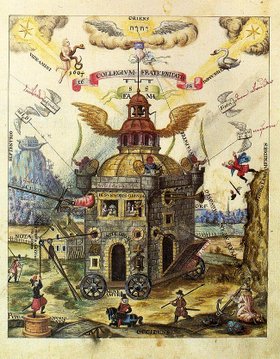The Invisible College
 The Invisible College (whose emblematic image is shown here in an illustration from Speculum sophicum Rhodo-stauroticum, a 1618 work by Theophilus Schweighardt) was the Rosicrucian College, identified by Frances Yates as the "Invisible College of the Rosy Cross".
The Invisible College (whose emblematic image is shown here in an illustration from Speculum sophicum Rhodo-stauroticum, a 1618 work by Theophilus Schweighardt) was the Rosicrucian College, identified by Frances Yates as the "Invisible College of the Rosy Cross".
It is sometimes described as a precursor group to the Royal Society of London. It consisted of a number of natural philosophers and may have also included some prominent figures who would be later connected with the Royal Society.
This article is not meant so much as a history lesson as it is the thought that an "Invisible College" might be something we could use again today.
This idea of having an "invisible college" can be found in German Rosicrucian pamphlets in the early 17th century and another playwright of Shakespeare's time, Ben Jonson, referenced it in several plays.
It was a group of scholars meeting to discuss and learn, but without actual courses, degrees or a campus of buildings.
In the Oxford Dictionary of National Biography, it is noted that a group of natural philosophers meeting in London from 1645 was identified as the "invisible college" by Thomas Birch, writing in the 18th century.
It might remind some readers of other more concepts of "expert communities" such as Epistemic communities or Communities of Practice.


In the book, Wagner argues that a shift from big science to global networks is creating new opportunities, especially for developing countries, to tap science's potential. Don't try to create 20th century scientific establishments and centers of learning, but use global networks of leading scientists to focus on research to address local problems.
My own thought is that some combination of online learning, MOOCs, alternative and personal learning networks - and maybe even "degrees" in some new format - may create a new Invisible College without buildings or a home campus that grows and travels from place to place as it is needed.
The concept is mentioned in Clay Shirky's book Cognitive Surplus: Creativity and Generosity in a Connected Age


It was the inspiration for the humorous Unseen University in 13 fantasy novels by Terry Pratchett

For now, the Invisible College (preferable to the Invisible University, which smells stronger of degrees) is fiction and fantasy. Of course, both invisiblecollege.com and invisibleuniversity.com are already owned by people who have parked the URLs for the time when...
Trackbacks
Trackback specific URI for this entryThe author does not allow comments to this entry

Comments
No comments